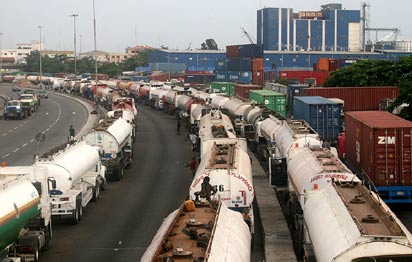The Apapa-Wharf Road, a crucial gateway to Nigeria’s premier and busiest seaport in Apapa, has descended into a state of disrepair, plagued by treacherous potholes. This deteriorating infrastructure has resulted in substantial financial losses for businesses, port users, and haulage operators who navigate its precarious conditions daily.
The dire situation is exacerbated by the hijacking of the Apapa-Oshodi Expressway, originally conceived as an alternative route to and from Apapa and Tin-Can Island Ports. This critical route has been commandeered by tankers transporting oil and gas products from the nearby tank farms along the Mile 2-Coconut axis.
The deteriorating state of the Apapa-Wharf Road not only disrupts daily business operations but also poses a severe threat to the potential revenue streams of Nigeria Customs Service, which generated a substantial N2.6 trillion in the previous year. In addition to this, the Nigerian Ports Authority, the Nigerian Maritime Administration and Safety Agency, and other entities collect hundreds of billions of naira in revenue, making the road’s condition a matter of paramount concern.
A visit to the port city by BusinessDay reporters uncovered the harrowing experiences faced by those seeking to exit the port via Ijora en route to Western Avenue. The road is now littered with fully loaded container trucks struggling to navigate the potholes and gullies that plague the Ijora section of the route.
Further compounding the problem, certain portions near the popular Leventis bus stop, specifically the service lane leading to the Marine Beach Bridge, are riddled with ditches and potholes. These road conditions affect both inbound and outbound traffic, causing significant disruptions to cargo movement.
Even the primary outbound lane of the Apapa-Wharf Road has not been spared, as a substantial pothole has emerged, creating bottlenecks for cargo evacuation from the port.
Tony Anakebe, a Lagos-based Customs-licensed agent, offered insight into the dire situation, emphasizing the poor condition of the Iganmu-Ijora section of the Apapa-Wharf Road. He explained that trucks laden with both empty and full containers now face significant difficulties accessing the port or leaving it due to the deteriorating state of the road. Tragically, this has resulted in incidents where fully loaded containers topple over, causing extensive traffic congestion and financial losses for importers.
Anakebe elaborated on the financial impact, stating, “Importers are recording huge losses on a daily basis due to the current state of port access roads. When these containers upturn on the road, it takes the importer an additional cost to rent another truck, containers, and labor to transfer the load on the spot. In some cases, the containers are vandalized by hoodlums even before the owner can get it out of the way.”
In response to the crisis, individuals and companies have initiated palliative measures to facilitate truck movement. However, these temporary solutions offer only short-lived relief.
Trucker Bala Mohammed lamented the deplorable condition of the Apapa-Wharf Road, highlighting the adverse impact on port business and cargo haulage. He emphasized that this critical access route to Nigeria’s economic gateway, responsible for trillions of naira in annual revenue for government agencies, has been left neglected.
He stated, “The state of the road is causing serious financial losses to truckers and importers because billions of naira worth of goods is destroyed when the container falls either going into or leaving the port while truckers get their trucks damaged in some instances.”
Apart from the financial losses, the road’s potholes have led to severe traffic congestion, extending the commutes of motorists for hours, particularly after business hours. This chaotic situation has also created opportunities for criminals and traffic robbers to exploit vulnerable passengers.
Motorists and industry stakeholders alike are urging the government to prioritize the Apapa-Wharf Road’s rehabilitation and declare a state of emergency to address the pressing issue. A long-term solution is urgently needed to ensure the smooth flow of goods in and out of the port, ultimately bolstering Nigeria’s economy.
Vicky Haastrup, a terminal operator, emphasized that despite progress inside the port by concessionaires, the surrounding infrastructure, notably the deteriorating access roads, fails to complement these advancements.
As the road’s condition continues to deteriorate, individuals like Bidemi Sule, a shipping agency staff member, recount daily nightmares stemming from the traffic congestion along the Apapa-Oshodi Expressway. The Mile 2-Coconut axis, clogged with congestion, compels motorists to resort to one-way routes in a desperate bid to avoid further delays.











